|
|
Some suckouts are just brilliant. Hopefully this is the turning point for me tonight after 8 straight out-of-the-money finishes in sit and go tournaments. I finished 3rd – it’s a start.
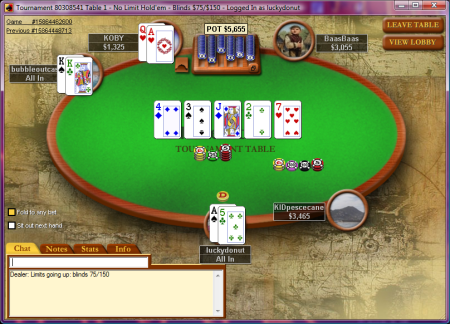
It was the first steal attempt I’d made in this tournament, and it all went badly wrong. I open-pushed ace-five from the button and got called immediately by pocket kings and then immediately afterwards by ace-queen suited.
When the cards were turned over I said out loud, "Oh great, I can’t win". Nobody was there to listen, or to remind me I actually had a 9% chance of taking it down.
The flop brought hope in the form of a mighty gutshot draw. "Oh, I can now – with a two", I continued for the benefit of the audience at home. You don’t always have to call it a deuce.
And the sweetest turn card sealed the deal. Ship it.
In a call to Tiscali Broadband technical support today I was told, in pigeon English of course:
"At peak times, between 5pm and 11pm, we block gambling sites".
In fact it’s only Playtech sites I’ve been having trouble with. That’s the iPoker network (home to major European operators like Blue Square, Bet365 and Paddy Power) and also their casino product that’s off limits. Others seem to be working OK.
There have been no such issues with my cable internet, so I could confidently deflect their arguments that it must be either me or the site I’m trying to connect to that had the problem.
I’m quite fortunate to only use have Tiscali as a backup internet provider (relying on the net to work from home this seemed like a good idea after too many daytime cable blackouts last year, so I picked the cheapest ADSL option).
However, the revelation that an ISP that I pay to – gosh – provide internet service only gives me access to certain parts of the net at their discretion came just a few minutes after the same person had told me emphatically, "no sir we do not block anything".
"You block BitTorrent though, don’t you", I enquired, knowing this to be the case.
"No. We. Do. Not. Block. Anything". She spoke to me in the same patronisingly slow way that I’d been reduced to using myself in order to be understood.
We’d already been through the rigmarole of trying to unearth my connection problem, despite me not actually having one. Is the router switched on? Is my PC switched on? Answer yes to both of these and they take their first stab at telling you it must all be your fault. No – I said I’m connected!
How many lights are on the router? Well, not only do you not know what router I have, the number of lights will depend on how many network cables are plugged into it, so how the hell does that tell you anything?
Apparently, if a light is flashing it means you don’t have a reliable connection (which is your fault, obviously) and not that data is being sent over the corresponding port, as I’d mistakenly believed for years.
Can I replace my microfilters in case they’re broken? Oh yes, sure. That question a master stroke in call avoidance, encouraging anyone who called from a landline to hang up by making them unplug their phone! Assuming, of course, that they actually have a spare microfilter – I can’t imagine many would.
"It’s not the router. It’s not the microfilter. Because! I’m! Already! Connected!"
I was only putting myself through all this because I just wasn’t sure if it was a blanket ban, a side-effect of their recent cock up that blocked iTunes, or because I’d actually made their shitlist that I was denied access to some online gambling via Tiscali.
I’m aware of their fair usage policy, under which the very highest bandwidth consumers are throttled during peak hours. Peak hours, here, are defined as 6pm to 11pm. Not 5pm to 11pm like they said on the phone. Certainly not 4pm to midnight, which is when I’m actually blocked from gambling with this ISP.
I really wouldn’t be surprised if I have been flaged as an unfair user. After all, I do download a fair few TV shows onto a PC in the living room (and I use Tiscali for this so it doesn’t slow down my connection for work). It’s only the same shows you’d actually get on TV, except this way I can often get them a little earlier – and in high definition. Although I have a Virgin Media V+ box with high-def output, the sum total of their HD content is one channel (BBC HD), which is only on for about 4 hours a day anyway.
I’d already noticed that it’s virtually impossible to use BitTorrent in the evening, but this really doesn’t matter much to me. I will just stick in whatever shows I want to download and let it do it’s stuff whenever. Usually everything is there the next day.
Under the fair usage policy, you get three strikes before you’re out. (1) Please reduce your usage. (2) Pretty please, with a cherry on top, reduce your usage. (3) Fuck you, now try surfing at teatime you little piece of shit. I’ve never had a single warning.
But now we know it’s a blanket ban. Online gambling, apparently, uses more of the network than other services and other customers could be affected by my degenerate activities. "Suppose there’s a file that another customer really wants to download, it could be really important to them and they can’t do it", was the brilliant example.
It must not be that important to me, however, if I’m playing online poker for real money and I’m disconnected mid-hand (clearly, this would never happen during working hours though…) or I’ve already bought into a tournament for this evening and then can’t log in to take my seat.
In fact it’s been an online casino that actually mattered to me this week. I have a £300 signup bonus that needs £8000 cycling through it on blackjack within 2 weeks or I’ll forfeit it. Expected value: £250. It’ll be a struggle if I can’t ever play before midnight.
After 35 minutes on the phone, I asked to speak to a supervisor, was put on hold, turned on speakerphone and got on with something else while I naively waited for somebody that doesn’t actually exist to pick up the call. Fortunately I used saynoto0870.com to find a geographic number so it was included in my mobile phone minutes, because this is when I eventually gave up waiting:
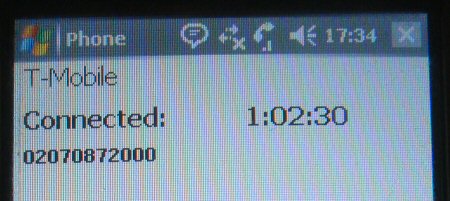
Here’s something I’ve never actually seen in an online tournament before – a player who was left with exactly one chip after losing an early all-in confrontation.
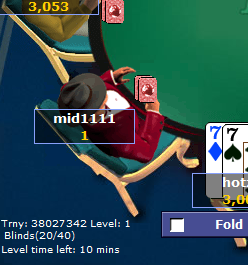
This is extremely rare, and with blinds starting at 20/40, it will almost never happen on the first level.
So if you want to try this at home and go for the most heroic chip-and-a-chair comeback to win ever, here’s how to get started:
Get into a three-way all-in situation on the very first hand. Make sure there’s enough dead money that the pot won’t divide evenly by 3, and make sure you are out of position so you receive the extra chip. Pushing from the small blind and forcing the big blind out will do; that 40 chip big blind splits nicely into 14/13/13.
In this case, everyone held a J on a 9TQK board. Never mind that it’s not the nuts, you can’t wait around that, just get all your chips in if the opportunity presents itself.
Now that you have exactly one more chip than another player, you just need to get it all-in against him and lose. Make sure nobody else that covers you is in the pot too, otherwise you’ll either bust out or finish with two chips instead of one.
Good luck!
Sporting Index were giving away more free money today, this time with their new blackjack game. Make ten bets for a stake of 20p or greater, the offer boasted, and have your net losses refunded up to £30.
Sounded like a real bargain at first. Could it really be as good as playing nine coinflip hands for 20p – a maximum swing of £1.80 either way – and then putting somewhere between £28 and £32 quid on one final no-risk punt?
Well no. It’s not really blackjack, of course, it’s a spread betting game based around a one-on-one hand of blackjack: if your hand wins, the result is 100 points; push, 50 points; lose, zip. Playing 20p per point on an even money proposition would involve a swing of about £10 on each bet.
I’ll use a hand with nice round numbers as an example of how this works: the player is dealt 15 and the dealer shows a six and the market for this hand is 40-45. Bet higher than 45 to back the player’s hand, or lower than 40 to back the dealer’s hand.
Because it’s impossible to push when you stand on 15, there are only two possible results after the hand plays out: zero or 100. If you buy this market (backing the player and betting on a dealer bust) you’ll win £55 or lose £45 for a £1 stake – effectively taking odds of 11-9 on the bust. Whereas if you sell (backing the dealer and betting that he’ll make a hand 17-21) you’ll lose £60 or win £40, therefore laying a much fatter 3-2 against the bust.
You can defy basic strategy and take another card for the player’s hand if you like because busting is irrelevant – it just deals again without any money changing hands. Or if the hand improves, the market will change before you put any money down.
You still get to bet after you hit up to 21 because you could still push for a result of 50 points (the market is 94-99 against any dealer card that isn’t a ten or ace – a choice of laying a hefty 99-1 vs taking a very lean 15-1), and you’re also still able to hit past 21. It took some doing, but eventually I managed to hit up to my first (and probably last) ever thirty-one!
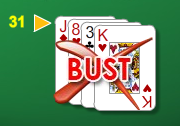
The five point spread on a market that only runs 0-100 is pretty significant. To cover both sides of the bet at £1 per point you’d need to bet £105 for a return of £95 regardless of the result. I make that a 4.76% house edge per bet!
Although not unusually high for some casino games, that must be the highest edge you’ll ever see for something pretending to be blackjack. Even an eight-deck game paying 6-5 for a blackjack and with every possible unfavourable rule you can think of is better than this. See for yourself here, the very worst set of common rules weighs in at 2.48%.
The best strategy I could think of to play this bonus was to only play bets with a small downside to qualify and then hope I had enough left for a coinflip bet at the end. It didn’t get that far, however.
I bet lower than 92 for 20p per point (maximum loss £1.60) with the player making 21 against the dealer’s ten. The dealer had to pull an ace here to score zero (win £18.40) or hit up to 21 to push (win £8.40).
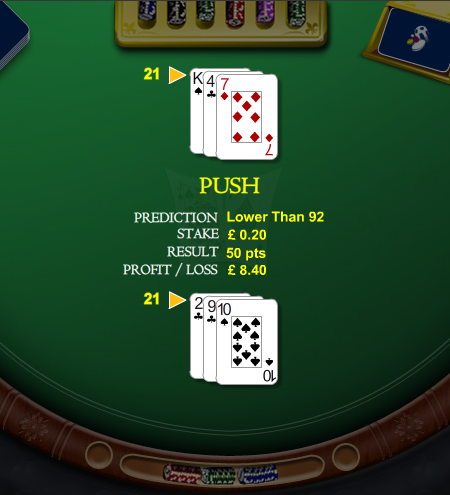
It wasn’t an easy promo to get maximum value out of, and eight free quid is eight free quid, so I called it day there. Winner winner.
I’ll keep my mouth shut in future.
Should have known really. One little blog post about a little bit of luck and it’s doomswitch time. Back-to-back sets followed by an eight buy-in downswing featuring any cruel and unusual beat you can care to think of. Blogging = -EV, obv.
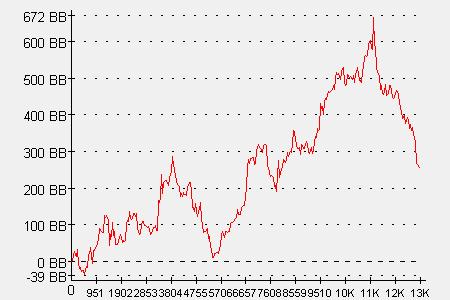
Pants, basically.
But if my calculations are correct, writing this should make everything better again. I’m surely on course for a break-even stretch now at the very least…
This is exactly what’s supposed to happen when you limp out of position and then call raises with medium pocket pairs. Although of course it hardly ever does, so it was particularly sweet to catch a miracle – and get paid – twice in a row.
Button ($37.40)
SB ($21.12)
BB ($8.50)
UTG Hero ($50)
UTG+1 ($22.05)
MP ($20.25)
MP ($17.50)
CO-1 ($48.75)
CO ($50.45)
Preflop: Hero is UTG with 8 8 8
Hero calls 0.50, UTG+1 raises to 2, 1 fold, MP calls 2, 5 folds, Hero calls 1.50.
Flop (6.75) Q A A 8 8
Hero checks, UTG+1 bets 5.50, 1 fold, Hero raises to 48, UTG+1 moves all-in for 14.55.
Turn (74.80) T
River (74.80) 4
Hero shows 8 8 8
UTG+1 shows A Q Q
Hero wins 74.80 with Three of a kind, Eights
Button ($20.87)
SB ($8)
BB ($50)
UTG Hero ($72.50)
UTG+1 ($20.25)
MP ($15.50)
MP ($48.75)
CO-1 ($50.45)
CO ($37.40)
Preflop: Hero is UTG with 7 7 7
Hero calls 0.50, 4 folds, CO raises to 2, 3 folds, Hero calls 1.50.
Flop (4.75) 9 3 3 7 7
Hero checks, CO bets 4, Hero raises to 70.50, CO moves all-in for 31.40.
Turn (110.65) 8
River (110.65) J
Hero shows 7 7 7
CO shows A A A
Hero wins 110.65 with Three of a kind, Sevens
I promise these were back-to-back hands on the same table. It says I was in the same position for both, which makes that sound a little fishy, but it’s totally true! A new player sat down to my right to take the big blind for the second hand, so I really was first to act on two consecutive deals.
Seeing as I’d already unticked "auto-post blinds" and was just getting ready to finish for the night, I’m quite glad he came along to give me one more hand…
It’s been a few weeks since there was a nice juicy promo from Sporting Index. In fact they tried to run one last week that I was going to play, but it got pulled due to "technical issues". I was a bit worried they’d realised they were giving too much away, but the same deal is back this weekend: net losses refunded on their new virtual game up to £50.
Weekends apparently now start on Thursday morning too.
Springo is a spread betting game based on bingo where you can bet on all sorts of wacky number things. There’s a card with 24 numbers and balls are drawn from 1-80. You could bet on how many numbers on your card are matched in 55 balls drawn (the spread is 17.4 to 17.8), or how many balls are spat out until your first hit (2.9 to 3.2).
You can also gamble on whether the numbers you match on your card form a particular patterns, like a plus sign, bullseye or heart.
Or for the truly degenerate, you can play one of the markets where numbers are multiplied together to get that oh-so important volatility. The spread for "First hit x Last hit" is 1385-1405 – bet £1 per point and you could win £3845 or lose £1385.
So here’s how I played it. There’s no even money bet in this game, or even anything that’s equivalent to fixed odds. So I took the least volatile market and the smallest stake possible: I played "Draw to a hit" ten times, buying at 3.2 for the minimum stake of 91 pence per point.
That bet meant the worst downside was £2 each game, with a maximum theoretical win of £43.50. The maximum likely win is much, much lower, as you’d have to draw 55 balls without hitting a single one on your card and that doesn’t leave much room for error. That’s every single number you don’t have except one. It’s so unlikely, in fact, that I can’t even be bothered to start working the odds. Astronomical. But there’s still the chance of a decent win for a controlled stake if things go the right way.
The first two games I played I matched the very first ball. That £4 maximum loss was not a good start, but playing this strategy it all comes down to the last game anyway: just try to lose as little as possible until you’ve qualified for the refund and then lump whatever you have left on one bet. Or, if you win during the qualifying period, you can just take that money and leave.
After 10 spins I was actually up by one unit: a massive 91p profit. But I decided to let it ride.
Buying for a pretty random £23.14 per point meant the maximum downside was £50.91 – perfect. The result was a good one too… five balls before a hit! A 1.8 unit win, or £41.65 in real money. Kerching!
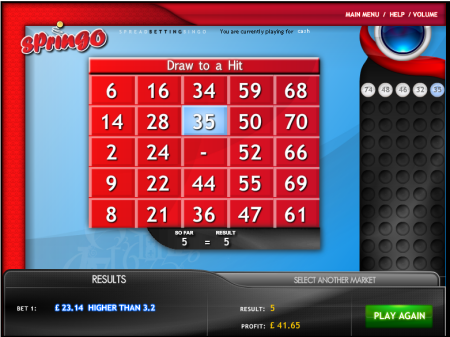
I’ve been 4-tabling 50NL on the iPoker network for about a week and starting to get some decent data into Poker Tracker. Not yet sure if I’ll make a mission out of it like I did on PokerStars earlier in the year – I’m not convinced it’s a great game, and there’s barely enough time before the end of the year to get in enough hands for a reasonable win goal.
Mostly I just want to retain the VIP level I achieved playing $2/4 limit (running like God for a couple of weeks, then crashing back down and giving up) for a sweet $100 monthly cash bonus. Playing for points is only marginally foolish, of course.
I’ve been thinking that there are a lot of super-tight – I mean really stupidly tight – players on there and have been seeing some Poker Tracker stats to that effect, but I just wasn’t really sure if it was just an anomoly at first. There’s always some nits in every game, but when I seem to be always sitting down to see table averages of % flops seen instantly pop up in single figures, it’s a little unusual.
Sure, I still don’t have enough data to know the figures are accurate, and I often have only half the table tracked, but it’s still a whole load more rocks that you’d like to see at the table.
As my data is grows, these trends continue. Just now I was playing against two of the nittiest players I’ve ever seen.
The first had paid to see 6.3% of flops – that’s 30 hands played from the 480 I’d seen him be dealt. Even 12% would be awfully tight, and he’s playing half that. It’s just one every 16. That’s only just more than the frequency you should be dealt a pocket pair. Even if that’s not his strategy, we know he has a very narrow range of hands when he does decide to play which means he’s a fairly predictable opponent (which I like) but he’s using a seat that could be taken by a player who is more likely to dump off his stack the next time I get a lucky flop (which I don’t like).
The other was an impressive 1.8% VP$IP ("voluntarily put money in the pot") over 220 hands. That’s just 4 non big blind hands played from a sample that’s one less than enough to include every possible starting hand (it won’t – that would be a statistical freak – but it’s big enough to start seeing patterns). Of those hands played, we saw two at showdown: he raised JJ from middle position and completed a small blind with 88. Those crazy gamblers.
There are many more players sitting at about 10% VP$IP and that means I’ve been jumping around tables a lot trying to find somebody to actually play with. There is the occasional juicy loose player that helps to keep the table average out of the gutter, but actually very few who fall in-between these extremes. A cynical man might say it’s just full of bots and shills…
It does seems like it’s been much easier than I’m used to to steal blinds and stab at pots, but also much harder to get payoffs with monsters so I’ve tried to start adjusting accordingly. I’m hesitating to go too far with the all-out aggression though because it just seems so unlikely that there would be so many players in one place – a poker site, of all places – who just don’t want to play poker.
I was starting to think that it never, ever went to 3 bets pre-flop in this game, and that all-ins were never called unless it was AA vs AA, or occasionally KK on a short stack. Plenty of ratholers about, but mostly also sitting back and waiting for a big pair. Seemed like winning a full stack was virtually impossible.
But you wait around for a week, then two come along at once.
My pocket kings got it all in pre-flop against an ace-jack for a full stack and it held up, and I flopped the nut straight with AK and re-raised all in against two players to be instacalled by AT – bottom pair, but top kicker. Yummy.
The other player – a 12% rock – said he folded a set. I believe him.
Those two hands literally doubled my win rate on the week. Obviously, I still need more data but here’s a graph that I can savour for the time being.
There are no bad beats in Blackjack – one of the reasons I’ve been enjoying playing it so much lately. What’s the worst that’s going to happen? You’ve made a 20 and the dealer shows a 6. Two hits later he’s got 21 and you lose. It sucks, but he’s going to beat you about 10% of the time here.
So it has to be a particularly lucky or unlucky streak to make it worth talking about, let alone posting a hand history – something I never thought I’d be doing.
I signed up a new account to William Hill Casino in a friend’s name. This is a trusting friend who isn’t exactly up to speed with where I’m gambling on their behalf, but it’s an arrangement that works great for me – I need more friends like that!
This gave me another go at their £50 signup bonus before it finishes at the end of this month – apparently to be replaced by a new and improved monthly bonus, which we’ll have to wait and see but I would expect it means one of the easiest casino signup bonuses is not going to be around much longer.
So this series of hands (raw hand history here) is the first ten hands I played using that account. Every single one of them lost. Bad karma for cheating the system perhaps, but it definitely demonstrates that there’s no such thing as "new depositors’ luck" at this site.
No casino operator with a clue and the ability to rig things even slightly would want a new player’s first experience to be ten losing hands of blackjack. The odds are about 700-1 against.
Hand 1:
I’m dealt 17 and stand. Dealer shows a 4, turns over another 4, then hits an 8 and then a 2 making 18.
Hand 2:
I stand on 18. Dealer shows a 2, turns over a 3, then hits a ten and a 5 for a winning 20.
Hand 3: Another 17. Dealer shown 8 and obviously has a ten in the hole.
Hand 4: With Q, 2 and dealer showing an ace I have to hit my 12. I draw a ten to bust.
Hand 5: Dealer shows another ace and I bust after hitting my T, 6 and drawing a 9.
Hand 6: With a dealt 7, 3 at least I can’t bust with a single hit. Best I can do though is another 7, which isn’t nearly enough to beat the dealer’s J, K for 20.
Hand 7: Perhaps 18 can win this time with my T, 8 against a dealer’s upcard 3. Nope. He’s got a 9 under there, makes it a promising 15 and pulls a miracle 5 for yet another 20.
Hand 8: I have to double down on my 4, 5 against the dealer’s 4 and only manage to muster a 3. Twelve doesn’t beat much, let alone the dealer’s piss-taking 21.
Hand 9: Soft 18 is a stand against the dealer’s 2. Can he beat it? Yes he can: K in the hole, and 8 makes 20.
Hand 10: Can’t split a pair of 7s when the dealer shows a ten, so I hit it. At least the 4 doesn’t bust me, but 18 isn’t enough. A 3 in the hole is promising at first, then he hits a 2 and 4 for 19. Of course.
Every time you play a hand differently from the way you would have played it if you could see all your opponents’ cards, they gain; and every time you play your hand the same way you would have played it if you could see all their cards, they lose.
— David Sklansky’s Fundamental Theorem of Poker
It’s now pretty much a certainty that at least one player on Absolute Poker has been able to play real money games while being able to see all of his opponents’ hole cards.
Absolute are saying publicly "this never actually happened" but privately "oh shit, we’re fucked". I’m speculating, obviously, but it seems likely. This is a poker site that used to dominate the BonusWhores.com newsletter with their almost-daily reload offers, but now they are top of their blacklisted sites list. PocketFives.com have also stopped taking their advertising money, and I’m sure this is only the beginning. Nobody with any sense will ever play there again for an amount of money that matters.
If you want to see the damning evidence and don’t want to trawl through many very long forum threads, jump straight to the latest updates on 2+2 or read this excellent summary on Nat Arem’s blog.
Or you could just hit play on this video. Thanks to an administrative cock-up of gigantic proportions, Absolute have given out a master hand history that shows player POTRIPPER winning a $1000 buy-in tournament while playing just about every hand perfectly. It really is just like he can see what everyone else is holding, over and over again.
This is just part 1. Get parts 2 to 4 here.
Sure, he gets sucked out on a couple of big pots, but it’s exactly like Sklansky says: if you can see everyone’s cards, you’re going to win money.
The basic strategy is to see a flop with any two cards, and then:
– If your opponent has a huge hand, just check and fold.
– If there is any hand you can represent to scare your opponent, bet or raise.
– If you have a monster or your opponent has nothing, let them catch up or give them chance to bluff.
The chances of this playing style being legitimate are as close to zero as you could possibly imagine.
|
|







 8
8




Comments